Houston Astros Charlie Morton: MLB’s leading headhunter
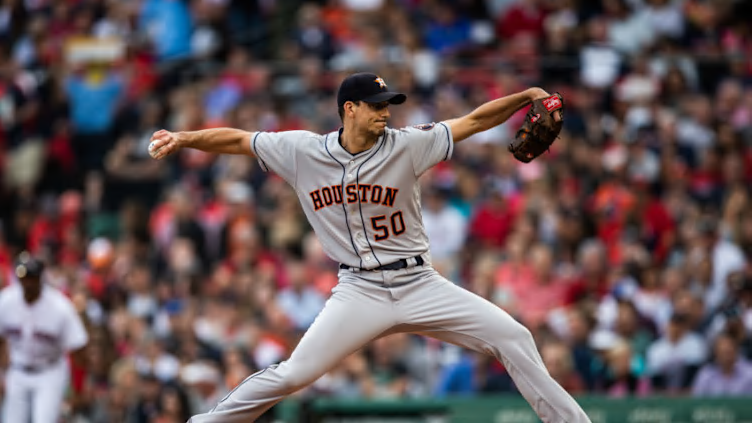
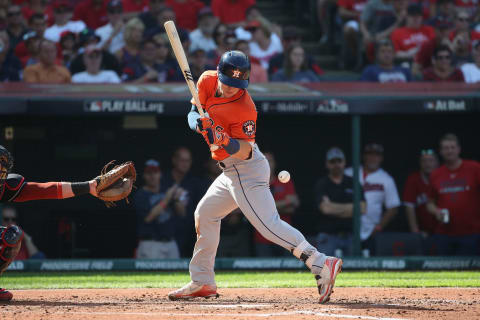
Houston Astros starting pitcher Charlie Morton has the highest rate of hit batters for all pitchers with more than 1000 career innings pitched.
When you think of pitchers known as “headhunters” in baseball terms, the names Don Drysdale, Bob Gibson, and Pedro Martinez probably come to mind. These are guys who had a reputation for owning the inside of the plate and if they hit a batter, well, that’s just part of the game. The batter shouldn’t have been crowding the plate.
Drysdale, in particular, was vocal about his views on the issue. He once said, “My own little rule was two for one. If one of my teammates got knocked down, then I knocked down two on the other team.” Another old-timer, Early Wynn, was asked if he would throw at his mom if she came up to bat and responded, “I would if she was crowding the plate.”
Pedro Martinez famously hit a batter when he was five outs from throwing a perfect game. It’s hard to believe it was on purpose, but with Pedro, you never know. The game was against the Cincinnati Reds back when Martinez pitched for the Montreal Expos. Martinez had come inside on Reds outfielder Reggie Sanders twice earlier in the game and plunked him in the elbow with one out in the bottom of the eighth inning, even as he had a perfect game in his sights.
Sanders charged the mound and tackled Martinez as the benches cleared. After the game, Martinez said, “There was no way I was trying to hit him. I guess he took it the wrong way. I was surprised he charged out. Surprised, but not afraid.” Sanders was ejected. Martinez ended up losing the no-hit bid in the ninth inning.
Of the four pitchers mentioned so far, the reputations of Drysdale and Martinez are backed up by the numbers. Looking at all pitchers since 1901 who have thrown at least 1000 innings in the major leagues, Martinez is in the 95th percentile for hit batters per 200 innings pitched (HBP/200 IP). Drysdale is in the 92nd percentile. They really did hit a higher percentage of batters than most other pitchers in baseball history.
Early Wynn, on the other hand, looks to be more bark than bite. Despite his quote about throwing at his mom, he ranks in the 19th percentile in HBP/200 IP. In a 200-inning season, Wynn averaged 2.8 hit batters. Martinez hit three-and-half times as many hitters, averaging 10.0 HBP/200 IP.
Then there’s the curious case of Bob Gibson.
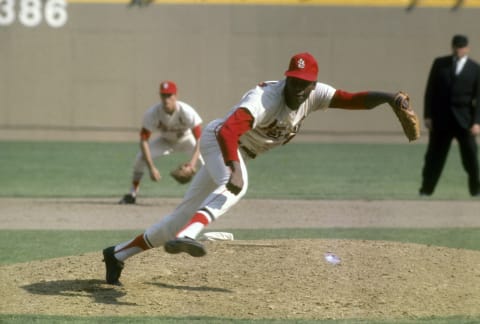
Baseball’s Headhunters: Bob Gibson
There are numerous quotes about Bob Gibson throwing at hitters. Here’s a sampling:
“Gibson was so mean, he’d knock you down and then meet you at home plate to see if you wanted to make something of it.”—Dick Allen.
“(Hank Aaron told me) ‘Don’t dig in against Bob Gibson. He’ll knock you down. He’d knock down his own grandmother if she dared to challenge him. Don’t stare at him, don’t smile at him, don’t talk to him. He doesn’t like it. If you happen to hit a home run, don’t run too slow, don’t run too fast. If you happen to want to celebrate, get in the tunnel first. And if he hits you, don’t charge the mound, because he’s a Gold Glove boxer.’ I’m like, ‘Damn, what about my 17-game hitting streak?’ That was the night it ended.”—Dusty Baker
“Barry Bonds? I’ll tell you what, if he hit a home run off Gibson or (Don) Drysdale and stood and admired it, they’d knock that earring out of his ear the next time up.”—NL umpire Doug Harvey
Gibson’s reputation for intimidation has lived on for a half a century. In retirement, he allegedly beaned a batter, Pete LaCock, in an Old Timers’ Game because LaCock hit a grand slam off Gibson in Gibson’s final major league game. After beaning him in the Old Timers’ Game, Gibson shouted, “I’ve been waiting years to do that!” Gibson also didn’t mind encouraging the legend, as this story about Ron Fairly reveals.
Despite all the stories about Gibson, he doesn’t rank anywhere close to Drysdale and Martinez on the HBP/200 IP list. He’s in the 60th percentile. He hit an average of 5.3 batters per 200 innings, which is a little more than half the rate of Pedro Martinez. Gibson wasn’t nearly the headhunter you’d think he was based on his reputation.
Among the pitchers of his generation, Gibson was in the upper third in his rate of hit batters, but definitely not in the Drysdale or Martinez stratosphere. Ironically, one of Gibson’s peers was Jim Lonborg, also known as “Gentleman Jim.”
While Gibson was known for his intimidating presence on the mound while hitting 5.3 batters per 200 innings pitched (from 1959-1975), the good “Gentleman Jim” Longborg was hitting 9.4 batters per 200 innings. It doesn’t seem fair, does it? No matter, it’s likely Bob Gibson didn’t give a damn about his bad reputation.
In today’s game, when it comes to beaning batters, current Astro Charlie Morton is more “Gentleman Jim” than “Batter Beaning Bob”.
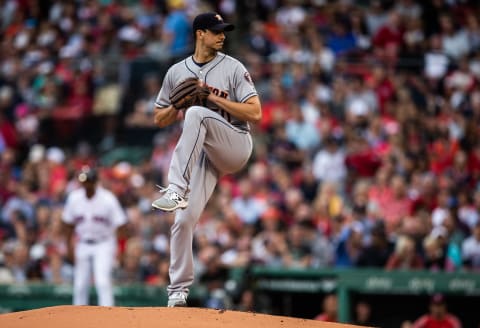
Baseball’s Headhunters: Charlie Morton
This brings us to the pitcher named in the title, Charlie Morton of the Houston Astros. Of the 1113 pitchers with at least 1000 innings pitched since 1901, Charlie Morton has the highest rate of batters hit per innings pitched. His rate of 17.4 HBP/200 IP is six times as high as Early Wynn. It’s three times the rate of the intimidating Bob Gibson and 1.7 times the rate of Pedro “the Plunker” Martinez.
Morton has led the league in HBP four times in the last six years. He’s led the league four times despite never pitching more than 175 innings in a season. In one of the years he didn’t lead the league, 2016, he only pitched 17.3 innings. In the other, 2015, he was one HBP away from leading the league despite pitching only 129 innings. He easily could have led the league five times in the last six years if he had pitched a few more innings in 2015.
Morton’s primary victim has been Jon Jay, who he’s hit five times in 37 plate appearances. This isn’t too surprising because Jay frequently gets beaned, so those five beanings shouldn’t all be blamed on Morton. Jay’s rate of getting hit by pitches is in the 99th percentile for all MLB players with at least 2500 plate appearances. If there’s a batter Charlie Morton is likely to hit, it’s Jon Jay.
With the caveat that correlation does not equal causation, it’s interesting to note how Morton’s career breaks down. In the first 473.3 innings of his career from 2008 to 2012, Morton hit 12.3 batters per 200 innings and had a 5.06 ERA (4.36 FIP). Since the start of the 2013 season, Morton has hit 20.7 batters per 200 innings and has a 3.69 ERA (3.69 FIP). The more batters he hits, the better he pitches!
When it comes to pitchers hitting batters, it’s a perfect storm for Charlie Morton. He hits batters at a high rate during a time when batters are being hit at a high rate.
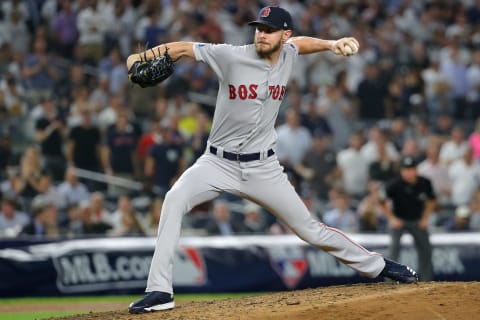
Baseball’s Headhunters: The rate is rising
Charlie Morton’s rate of 17.4 HBP/200 IP is a significant jump from the number two guy on the list, Jack Warhop, who pitched for the New York Highlanders and Yankees from 1908 to 1915. Warhop hit 16.1 batters per 200 innings.
Other pitchers at the top of the all-time list for hit batters per 200 innings include Justin Masterson, Jamey Wright, Kerry Wood, Dave Bush and Vicente Padilla. Chris Sale and Johnny Cueto are also high on the list. If many of those names are more recognizable than Jack Warhop, that’s good because they should be. They’ve all pitched this millennium, unlike Warhop, who pitched more than 100 years ago.
There’s a reason the names at the top of the HBP/200 IP list are pitchers who toed the rubber in recent seasons. The number of batters getting beaned has been generally increasing since the early 1980s. Most baseball fans have heard that strikeouts are at an all-time high. The whiff has been increasing every year since 2005, including a record-setting 41,207 strikeouts this season. Well, another record set this season was batters hit.
In 2018, pitchers hit an average of 8.8 batters per 200 IP. That’s a higher rate than the legendary Bob Gibson by a good amount. The average pitcher today hits three more batters per 200 innings than Gibson hit. Before this season, the previous record for HBP/200 IP was set in 2001. Third on the list is the 2004 season. In fact, the top 25 seasons in HBP/200 IP have all come since 1993. We’re in the Golden Age of batter beanings.
Consider the numbers by decade, going back to 1901:
1900s—7.5 HBP/200 IP
1910s—6.1 HBP/200 IP
1920s—4.7 HBP/200 IP
1930s—3.3 HBP/200 IP
1940s—3.0 HBP/200 IP
1950s—4.3 HBP/200 IP
1960s—4.9 HBP/200 IP
1970s—4.3 HBP/200 IP
1980s—4.0 HBP/200 IP
1990s—6.2 HBP/200 IP
2000s—8.1 HBP/200 IP
2010s—7.5 HBP/200 IP
— BobbyBaseball (@bballonthebrain) October 11, 2018
It should be noted that HBP data wasn’t officially recorded before 1920, so the numbers for the 1900s and 1910s have been filled in as best as possible by researchers. After higher rates in the first two decades of the 20th century, hit batters dropped in the 1920s and 1930s before bottoming out in the 1940s. They rose again in the 1950s and 1960s, then dropped in the 1970s and 1980s. The last three decades have been among the highest ever.
Of course, not all pitchers are beaning batters. Let’s take a look a the other guys.
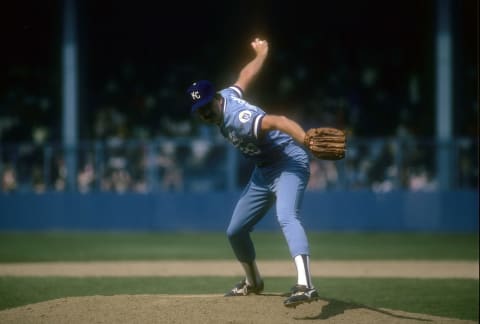
Baseball’s Headhunters: The other guys
Finally, let’s take a quick look at the guys on the other end of the spectrum, the guys who rarely hit batters. Perhaps they are nicer people than the Charlie Mortons, Don Drysdales and Pedro Martinezes of the world, or perhaps they just had different pitching styles.
The pitcher at the very bottom of the list is Ivy Andrews, who no one reading this has ever heard of. He pitched with the Yankees, Browns, Red Sox and Indians from 1931 to 1938 and has a large face, with big, full cheeks, like a chipmunk. His nickname was “Poison” as in “Poison” Ivy Andrews. He only hit four batters in the 1041 innings he pitched in his career. Charlie Morton hit four batters in one game this season, including Jurickson Profar twice.
A couple pitchers from the 1970s that some of you may have heard of who also rarely hit batters are Mike Cuellar and Ron Guidry. Cuellar hit 12 in 2808 innings (0.9 HBP/200 IP) and Guidry hit 13 in 2392 innings (1.1 HBP/200 IP). They were both lanky lefties who each won an AL Cy Young Award.
Then there’s one of my all-time favorite players, submarining pitcher Dan Quisenberry, who only hit seven batters in 1043.3 innings (1.3 HBP/200 IP). Quisenberry truly was one of the nicest guys to ever play the game. He was also one of the least intimidating pitchers to take the hill. He didn’t huff and puff like Al Hrabosky or have the large, manly presence of Goose Gossage or throw pure fire like so many relievers these days.
More from Call to the Pen
- Philadelphia Phillies, ready for a stretch run, bomb St. Louis Cardinals
- Philadelphia Phillies: The 4 players on the franchise’s Mount Rushmore
- Boston Red Sox fans should be upset over Mookie Betts’ comment
- Analyzing the Boston Red Sox trade for Dave Henderson and Spike Owen
- 2023 MLB postseason likely to have a strange look without Yankees, Red Sox, Cardinals
Quisenberry was a tall, thin guy with a 1980s mustache who looked more like an accountant than a baseball player. He threw from down under, relying on a sinkerball to get groundouts. He learned the pitch from Pittsburgh Pirates reliever
, who may have been even less intimidating than Quisenberry because he added a pair of glasses to the tall skinny frame they had in common. Tekulve didn’t hit many batters either (2.4 HBP/200 IP, 13th percentile).
Not only did Quisenberry rarely hit a batter, he also didn’t walk many batters, strike out many batters or allow many home runs. He was the opposite of everything baseball has become. And yet, he led the AL in saves five times in six years from 1980 to 1985.
That’s impressive for a guy who once said, “Most pitchers fear losing their fastball and, since I don’t have one, the only thing I have to fear is fear itself.” Batters didn’t have to fear Quisenberry, whose fastball likely didn’t do much damage to the seven batters he hit in his 12-year career. That just so happens to be the number of batters Charlie Morton hit in the 29 days from June 3 to July 1 this season. That was a banner month for the King of HBPs.
dark. Next. Fan celebrates Springer homer with beer purchase
While the Houston Astros Morton may not exemplify an intimidating, hard-throwing starter the way “headhunters” of the past did, but he does exemplify a movement of any pitcher being a guy who could end up plunking a hitter.